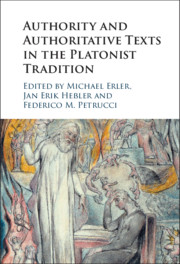Book contents
- Authority and Authoritative Texts in the Platonist Tradition
- Authority and Authoritative Texts in the Platonist Tradition
- Copyright page
- Contents
- Figures
- Contributors
- Acknowledgements
- Abbreviations
- Introduction
- Chapter 1 Xenocrates’ Invention of Platonism
- Chapter 2 An Iconography of Xenocrates’ Platonism
- Chapter 3 Arcesilaus’ Appeal to Heraclitus as a Philosophical Authority for His Sceptical Stance
- Chapter 4 Authority beyond Doctrines in the First Century bc
- Chapter 5 Authority and Doctrine in the Pseudo-Pythagorean Writings
- Chapter 6 Constructing Authority
- Chapter 7 Plutarch’s E at Delphi
- Chapter 8 Aristotle’s Physics as an Authoritative Work in Early Neoplatonism
- Chapter 9 Conflicting Authorities? Hermias and Simplicius on the Self-Moving Soul
- Chapter 10 Kathēgemōn: The Importance of the Personal Teacher in Proclus and Later Neoplatonism
- Chapter 11 ‘In Plato we can see the bad characters being changed by the good and instructed and purified.’
- References
- Index Locorum1
- General Index
Introduction
Published online by Cambridge University Press: 19 February 2021
- Authority and Authoritative Texts in the Platonist Tradition
- Authority and Authoritative Texts in the Platonist Tradition
- Copyright page
- Contents
- Figures
- Contributors
- Acknowledgements
- Abbreviations
- Introduction
- Chapter 1 Xenocrates’ Invention of Platonism
- Chapter 2 An Iconography of Xenocrates’ Platonism
- Chapter 3 Arcesilaus’ Appeal to Heraclitus as a Philosophical Authority for His Sceptical Stance
- Chapter 4 Authority beyond Doctrines in the First Century bc
- Chapter 5 Authority and Doctrine in the Pseudo-Pythagorean Writings
- Chapter 6 Constructing Authority
- Chapter 7 Plutarch’s E at Delphi
- Chapter 8 Aristotle’s Physics as an Authoritative Work in Early Neoplatonism
- Chapter 9 Conflicting Authorities? Hermias and Simplicius on the Self-Moving Soul
- Chapter 10 Kathēgemōn: The Importance of the Personal Teacher in Proclus and Later Neoplatonism
- Chapter 11 ‘In Plato we can see the bad characters being changed by the good and instructed and purified.’
- References
- Index Locorum1
- General Index
Summary
If one had to provide a formal account of what ‘being a Platonist’ means, it would be tempting to refer to the broad idea that a Platonist is, in general, a follower of Plato, which implies a commitment to Plato’s authority. After all, this would be a reasonable description for all heirs of Plato, from the Academics – the scholarchs of the Academy were in any case the successors of Plato, and claimed for themselves the privilege of this relationship – to late-antique Platonists, who regarded themselves as exegetes and interpreters of Plato’s thought. Things are not that easy, however, for once one examines such a general account in detail a series of serious questions emerge. A first – and clearer – puzzle is related to the discontinuity of the tradition: while on the one hand one can say that there is a continuous stream of heirs of Plato from the Early Academy to late Neoplatonism, on the other it is quite obvious that, even admitting a strong continuity between Middle Platonism and Neoplatonism, the philosophical history of the ‘Platonist tradition’ from the Early Academy to the early Imperial Age hardly constitutes a unified whole. As a consequence, just stating that all followers of Plato were committed to his authority would amount to an empty and uninformative statement: the more one generalises the notion in order to make it comprehensive, the less it is specific and able to really include the distinguishing features of each stage of the tradition.
- Type
- Chapter
- Information
- Publisher: Cambridge University PressPrint publication year: 2021



